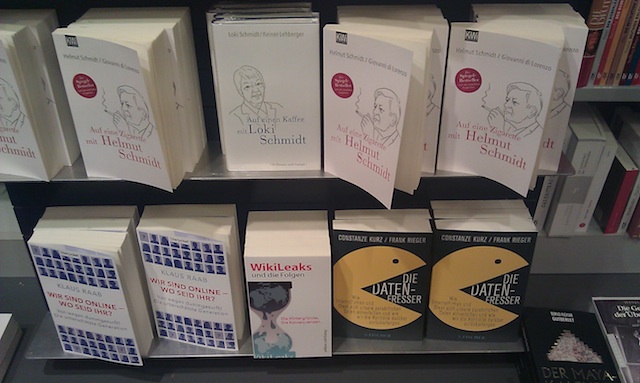Der CCC hat heute zusammen mit iRights ein neues Modell für die Vergütung von Kunst, Kultur uns schöpferischen Werken im Digitalzeitalter mit dem Arbeitstitel Kulturwertmark vorgestellt.
Das primäre Ziel des Konzepts ist ein Aufbrechen der festgefahrenen Debatte, die seit einigen Jahren grob in zwei Lagern festgefahren ist. Auf der einen Seite sind die Verwerter und ihre politische Lobby, die eine immer weitergehende Einschränkung von technischen und kommunikativen Freiheiten, restriktive Strafverfolgung von Filesharing und nutzerfeindliche Geschäftsmodelle durchdrücken, um den Status quo zu sichern. Auf der anderen Seite stehen die Nutzer, die immer weniger Verständnis dafür aufbringen können, daß sie für Inhalte so viel Geld ausgeben sollen und dafür auch noch gegängelt werden und sich dann eben einfach digitale Kopien irgendwo im Internet besorgen.
Zwischen den Fronten zerrieben werden dabei die Kreativen, die Autoren und Musiker, bei denen immer weniger Geld ankommt und die einerseits zunehmend weniger Lust haben, das Spiel der Verwerter mitzuspielen und sich in einem Kampf gegen ihre Hörer und Leser instrumentalisieren zu lassen aber andererseits auch nicht von Luft und Liebe allein ihre Gitarrensaiten kaufen und ihre Miete bezahlen können.
Schöpferische Werke leben von Aufmerksamkeit, daher beruht die Kulturwertmark zwar auf einem universellen finanziellen Beitrag aller Nutzer, der dann aber Hilfe von anonymem Micropayment von jedem selbst verteilt werden kann. Es wird also de facto ein zweiter Markt für Kunst und Kultur mit einem garantiertem Mindestvolumen geschaffen. Die Trägerstruktur muss tatsächlicher demokratischer Kontrolle von Künstlern und Nutzern unterliegen und unabhängig von Staat und Verwertern organisiert sein.
Bevor ihr weiterlest bitte einmal hier entlang und das Kulturwertmark-Konzept incl. FAQ lesen, das sollte die meisten Fragen beantworten. Wir haben leider noch kein schönes Schaubild, das das ganze auf einen Blick übersichtlich macht. Wenn ein talentierter Pixelkünstler uns hier aushelfen könnte, daß wäre total großartig. Und ja, der Name “Kulturwertmark” ist vielleicht auch noch optimierbar, Vorschläge herzlich willkommen.
Ich war in die Entstehung und Kondensation des Ideenkosmos in ein präsentierbares Konzept recht intensiv involviert. Die wichtigsten Grundlagen entstanden in langen Diskussionen und Abwägungen mit Pavel, Erdgeist, Constanze und vielen anderen in- und ausserhalb des Clubs. Wir haben uns fast zwei Jahre Zeit gelassen, weil uns schon klar war, daß die Lösung des Vergütungsproblems und der zukünftigen Zugänglichkeit von Werken eines der dicksten zu bohrenden Bretter in Digitalien ist. Deswegen haben wir dann auch das Konzept mit vielen Kreativen aus allen möglichen Bereichen debattiert, es verfeinert und angepasst, bis es die heutige Form bekam. Möglicherweise kann man das Konzept sogar auf Journalismus, Zeitungen und ähnliche Gebiete ausweiten, wir wollten aber erstmal überhaupt die Diskussion mit neuen Gedanken eröffnen.
Das bei der Umsetzung der Teufel im Detail liegen wird ist uns natürlich auch klar. Die interessensneutrale Strukturierung der Stiftung und vor allem auch das technische und ökonomische Desgin der genauen Regeln für Werke, Auszahlungsmodalitäten etc. um Mißbrauch einzudämmen bedarf einiges an sorgfältiger Arbeit und vermutlich einer Experimentierphase. Wir haben in Deutschland dafür zum Glück genügend intellektuelles Potential. Das die Detailarbeit getan werden muss, sollte uns aber nicht davon abhalten, uns ersteinmal auf grundlegende Prinzipien zu verständigen. Wenn es einen breiten Konsens gibt, daß wir als Gesellschaft die Finanzierung unser Kultur mit mutigen, zeitgemäßen Lösungen wie der Kulturwertmark angehen wollen, werden wir die Details auch zufriedenstellend geregelt bekommen.
Am Ende geht es darum einen fairen Ausgleich zu finden und vor allem von den alten Dogmen runterzukommen. Eines muss man ganz klar sagen: ein Recht auf Reichtum für die Brittneys und Justins dieser Welt ist im Kulturwertmark-Konzept nicht vorgesehen. Es geht um die Finanzierung einer breiten, bunten Schöpfungskultur, um einen neuen gesellschaftlichen Vertrag für die Sicherung unser geistigen Zukunft.
Update: Bisher bester Namensvorschlag kommt von AhoiPollio HuldigungsGulden. Find ich gut :-)
Update2: Auch sehr schön: Culture Crowd Coins (von Fiedel)
PS: Kommentieren ohne das Kulturwertmark-Konzept gelesen und verstanden zu haben ist nicht erwünscht. Ich werde das ausnahmsweise etwas restriktiver handhaben.


